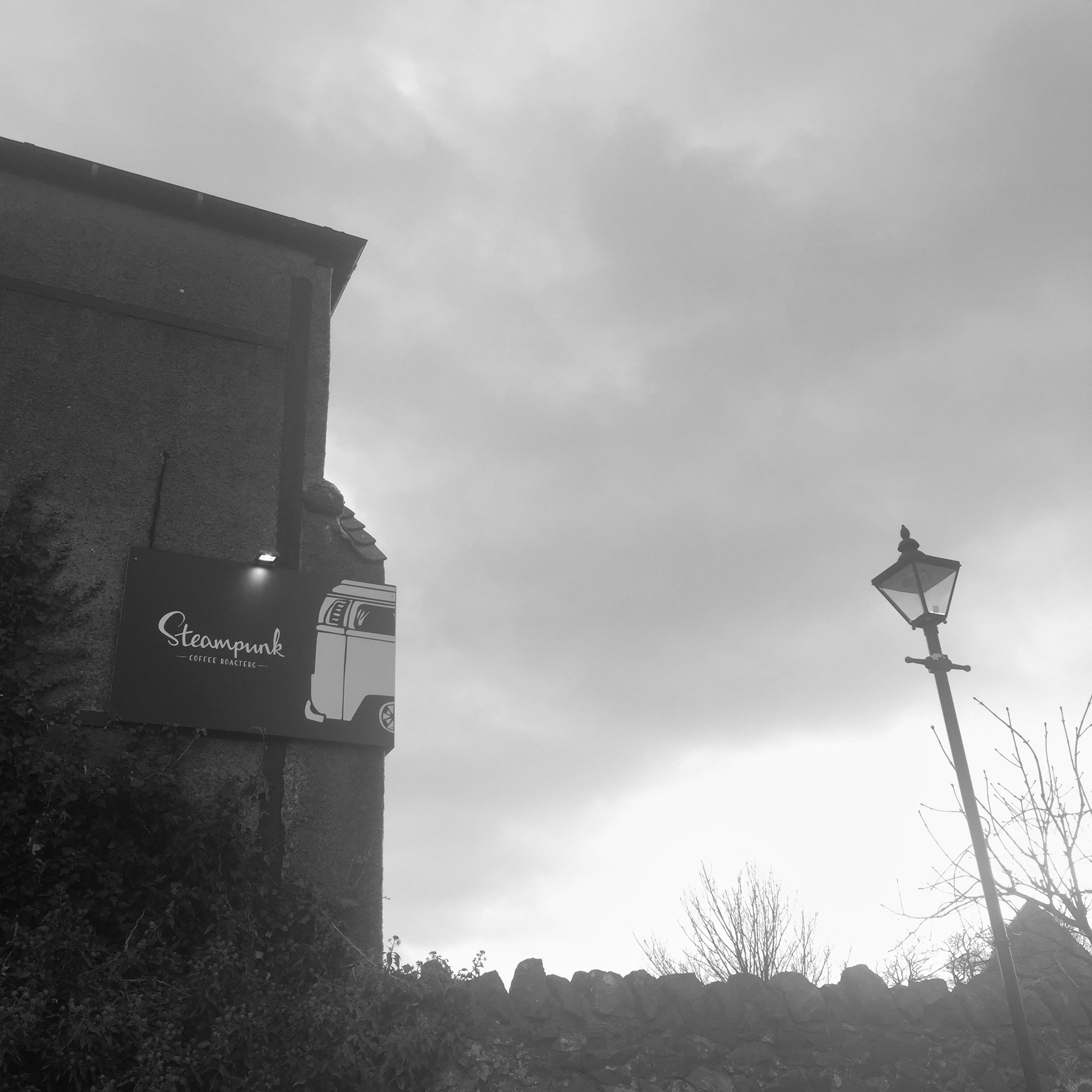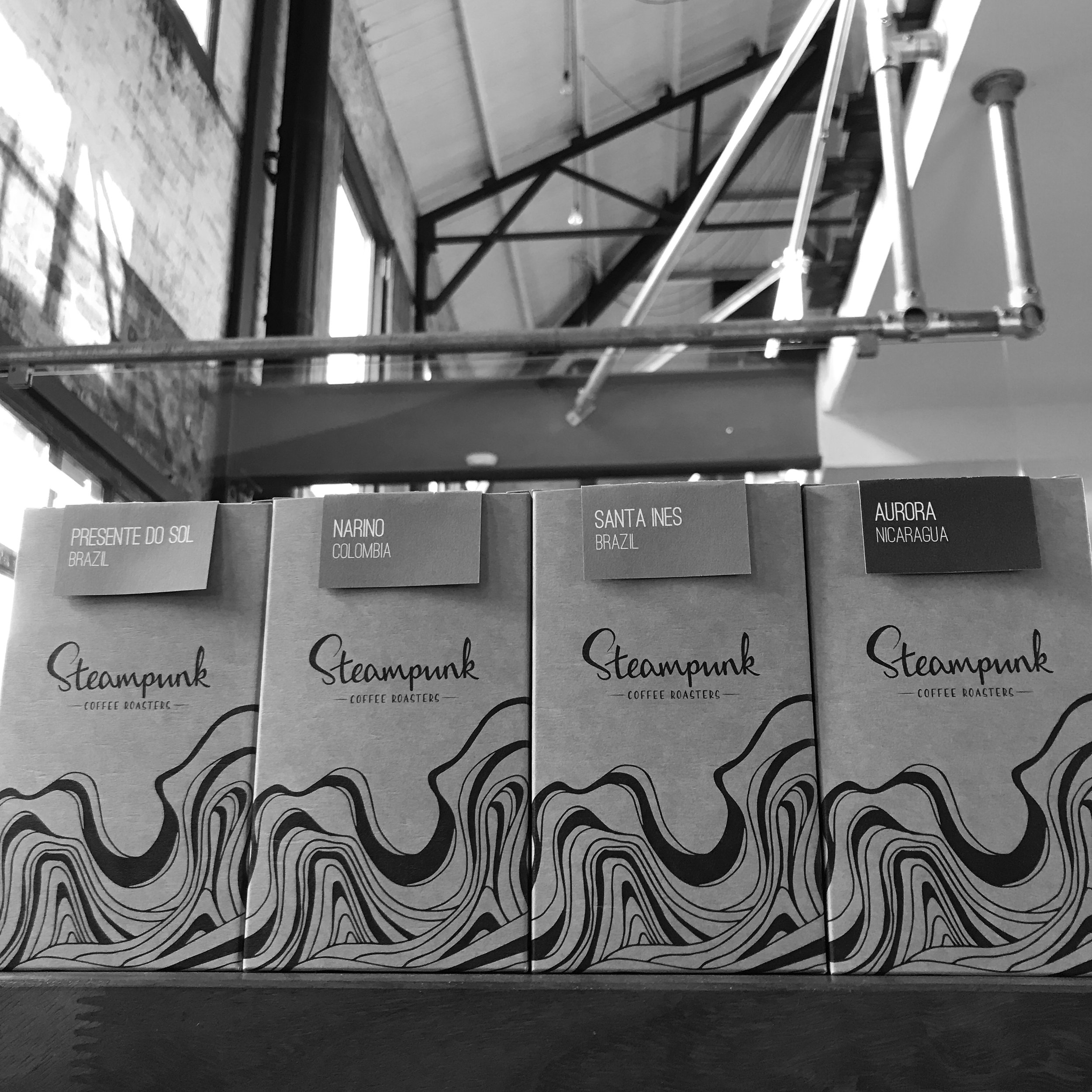A Fundraiser for Gaza Hopes to Wake Up the Coffee Industry
For 18 months, the coffee industry has remained mostly silent about the ongoing destruction of Gaza. A new fundraiser hopes to raise money—and jolt the industry awake.
The founder of Steampunk Coffee in North Berwick talks about the beginnings of the company and how its environmental goals emerged

Steampunk Coffee Roasters is one of my all-time favourite coffee companies. The Warehouse in North Berwick is a wonderful, welcoming cafe full of warmth and puppies. If you're ever in the area, you should seek it out.
Since moving back to Michigan last autumn, I've continued to follow the company via the magic of social media, and been continually impressed with how Steampunk's owner, Catherine Franks, has encouraged environmental and sustainability goals for her business. Coffee is, at its core, rather a wasteful enterprise—from processing to shipping, roasting to consumption—but it's encouraging to see more and more companies begin to address this waste.
Whether that's cutting down on plastic packaging for their coffee, offering generous incentives to customers for using their own travel mugs, or something as basic as not selling bottled water, Steampunk really does seem to be walking the environmental walk.
I spoke with Catherine via email, and in Part 1 we talk about the beginnings of the company and how its environmental goals emerged. Part 2 will be posted next Tuesday.
This interview has been lightly edited for clarity.
Can you begin by telling me a bit about how you got started in coffee, and how Steampunk came about?
Steampunk started in August 2012 with the installation of a vintage 12kg Probat in my garage. We roasted coffee that we then sold out of the back of my 1976 VW camper at festivals and markets. We are still roasting on the same machine but it moved to our lovely warehouse building in 2014, from where we run a busy cafe.
My start in coffee was growing up in the US drinking bottomless mugs of diner coffee, but I got into specialty when I opened a cafe in North Berwick in 2009 and got coffee from Artisan Roast. They were the only independent roaster in Edinburgh at the time and I remember what a revelation their flat white was the first time I had one.
Things have certainly changed since then with so many new roasters and cafes opening all the time.
What were your goals/ambitions in the early days?
When I started Steampunk I wanted very much to make specialty coffee accessible to those outside the coffee scene, and break down the stereotypes of that kind of coffee being only for coffee geeks and hipsters.
I like the sustainable side of specialty, that growers are earning more for their coffees, thereby improving the way that they care for their environment and workforce and that benefit is passing into the coffee producing communities. It seems less exploitative than the commodity model. It certainly reflects the values we hold as a business.
Why the name "Steampunk"?

Steampunk was coined to describe a type of Science Fiction where a future world is imagined which is powered by steam and Victorian machinery. That combination of old and new is at the heart of how Steampunk Coffee operates. From the beginning we have repurposed things and used old furniture and things that would be thrown away by many.
I love old things personally, I feel they have interesting histories and so much more character than something new and mass produced. Certainly this use of vintage things and repurposing is what gives Steampunk our distinctive character. It is also a vastly more environmentally friendly approach than buying things new.
I'm very interested in your cafe, the Warehouse. It feels like the ground floor of the company's sustainable sensitivities—lots of recovered and reused materials. What were your inspirations when designing it? Is it now how you originally envisaged it, or have things changed along the way?
Everything grows organically at Steampunk. We needed a sink so we looked around to see what we could use—the result is that our bathroom sinks are old copper brewer’s funnels set into knackered old bedside tables from a junkyard.

Sometimes it works the other way around too. We had an old desk in the roastery we no longer needed there, so we took the top off and have made a new table for the cafe out of it. We also source locally where we can and have contacts with so many creative people. When we opened the cafe our water jugs were all made out of old wine bottles that had been cut and shaped by a glass artist.
It is this combination of all of these special one off details that gives Steampunk its unique feel. It is not a ‘concept’ and was not done by a designer. I did have an overarching vision though and I am a stickler for details. An example is only using cloth hand towels. I didn’t want paper towels for the waste and I hate the noisiness and spraying water caused by air dryers so we have stuck with little cloth towels.
That tiny distinctive feature gives a special bit of luxury that doesn’t seem important on its own, but actually I think is crucial as part of a larger whole and very distinctive to us.
Can you tell me about your broader environmental/sustainability goals with Steampunk?
We were definitely eco before eco was cool! Central to the way the whole business operates is a strong ethical code. I do not believe in economic growth as a central business goal. I believe a business should be economically sustainable, certainly, but that success is measured in the quality of offering and the benefit the business brings to the local community and its team of workers in addition to its financial bottom line.

I think that it is possible to run a thriving and sustainable business if you are aware of your place within the local community and you run it in line with your ethical code. We have enjoyed tremendous local support for what we do and we have never shied away from steering our own course or standing up for what we believe in.
So from the beginning we have worked within environmental parameters which we think are important. We minimise plastic use (we have never sold bottled water for example, instead offering free and easily accessible tap water) and design our menu to reduce food waste to practically zero.
This has opened us up to criticism over certain ways we do things on occasion, but generally if we explain the reasoning behind our stance people come on board. We want to continue to improve because we believe there is always room for improvement.
So this year we launched the ‘New Year’s Revolution’ where each month we focus on a different area. We believe that everyone can take small steps and all of those together really add up. So we try to share ideas that help people make some simple changes in their daily lives.
Part 2 of this interview will be posted next week.
A newsletter about coffee—its culture, politics, and how it connects to the wider world.